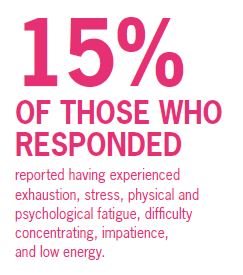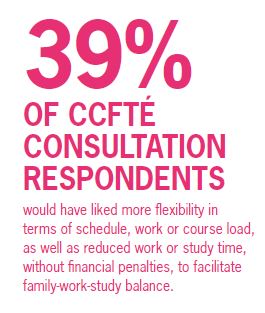Exhaustion, stress, physical and psychological fatigue, difficulty concentrating, impatience: these are the effects of family-work-study balance on many people.
In April 2020, the Coalition pour une conciliation famille-travail-études (CCFTÉ), of which the CSQ is a part, held a consultation via social media. The results of the consultation highlighted the various balance issues encountered during the lockdown period. Just over 600 people responded to the questionnaire, the vast majority of which were women (83%).
The consequences of health measures
The closure of schools and of the majority of early childhood educational services and school daycare services in the spring of 2020 created a whole balance conundrum for many Québec families.
In fact, these closures are among the four main health measures having had the greatest impact on family-work-study balance. The other two are teleworking or online learning, and the lack of a quiet place that promotes concentration.
Effects on mental health
 The lockdown period also deprived many families and caregivers of their usual support network (family, loved ones, etc.). Caregivers and parents were left to fend for themselves with a complete lack of collective reconciliation measures.
The lockdown period also deprived many families and caregivers of their usual support network (family, loved ones, etc.). Caregivers and parents were left to fend for themselves with a complete lack of collective reconciliation measures.
Despite the opening of certain early childhood education services and emergency school daycare centres, people who worked and studied remotely or worked in essential services (grocery stores, pharmacies, etc.) had to remain available for work or study, while also being responsible for their children or loved ones.
It’s no wonder that in such a context 15% of those who responded to the CCFTÉ consultation reported exhaustion, stress, physical and psychological fatigue, sometimes accompanied by difficulty concentrating, impatience with children, and a loss of energy.
Measures that accommodate …
Nearly three-quarters of those who took part in the consultation said they benefited from accommodation measures related to work or study time, while 26% said they did not.
The consultation also found that balance rested on the shoulders of students and workers, and that there was a lack of support and flexibility from managers or educational institutions during this period.
In the absence of collective measures, teleworking, normally seen as a measure promoting family-work-study balance, comes with its share of problems.
 … but not enough
… but not enough
To facilitate family-work-study balance, 39% of respondents would have liked more flexibility in terms of schedule, workload or studies, as well as a reduction in work or study time, without financial penalties.
Changes in the work environment regarding ergonomics and work tools were also identified as a desired measure. While workers who occasionally worked from home before the pandemic could make do with their kitchen tables, the arrival of full-time telework has changed the game.
In conclusion
The general finding of the consultation is that the individual means put in place by respondents in an attempt to reconcile the different areas of their lives were not sufficient. The lockdown has highlighted the need for collective measures since teleworking can no longer be considered an effective means of reconciling family, work, and studies.
The results of the Coalition’s survey were presented to the Minister of Labour and the Minister responsible for the Status of Women, as well as to resource persons at the ministry of Families responsible for this issue.
The CCFTÉ recommends that the Québec government implement an umbrella act aimed at promoting and supporting family-work-study balance that would apply to the private, public, and parapublic sectors.
The four measures with the most impact on balance:
- the closure of early childhood education services and daycare centres
- the closure of schools and school daycare services
- teleworking and online classes
- the lack of a quiet place that promotes concentration
